Environmental Factors and Survey Research in Developing Countries: Evidence from Nigeria
Added on 2023-04-23
21 Pages8858 Words58 Views
See discussions, stats, and author profiles for this publication at: https://www.researchgate.net/publication/269695759
ENVIRONMENTAL FACTORS AND SURVEY RESEARCH IN
DEVELOPING COUNTRIES: EVIDENCE FROM NIGERIA
INTRODUCTION
Article · January 2013
CITATION
1
READS
344
2 authors:
Some of the authors of this publication are also working on these related projects:
Diversification and Restructuring View project
Business plan competition View project
Lukman Raimi
American University of Nigeria
104 PUBLICATIONS 185 CITATIONS
SEE PROFILE
Moruf Adebakin
Yaba College of Technology
3 PUBLICATIONS 3 CITATIONS
SEE PROFILE
All content following this page was uploaded by Lukman Raimi on 18 December 2014.
The user has requested enhancement of the downloaded file.
ENVIRONMENTAL FACTORS AND SURVEY RESEARCH IN
DEVELOPING COUNTRIES: EVIDENCE FROM NIGERIA
INTRODUCTION
Article · January 2013
CITATION
1
READS
344
2 authors:
Some of the authors of this publication are also working on these related projects:
Diversification and Restructuring View project
Business plan competition View project
Lukman Raimi
American University of Nigeria
104 PUBLICATIONS 185 CITATIONS
SEE PROFILE
Moruf Adebakin
Yaba College of Technology
3 PUBLICATIONS 3 CITATIONS
SEE PROFILE
All content following this page was uploaded by Lukman Raimi on 18 December 2014.
The user has requested enhancement of the downloaded file.

.
1362
ENVIRONMENTAL FACTORS AND SURVEY RESEARCH IN DEVELOPING
COUNTRIES: EVIDENCE FROM NIGERIA
Raimi, L. 1
Adebakin, M. A. 2
Gabadeen, W. O.3
ABSTRACT
Survey research is relevant and appropriate for problem identification and provision of objective
explanations to hidden phenomena of interest to researchers. Despite the preference for surveys
by researchers in the fields of social sciences, management and educational management, it is a
research strategy that is confronted by a number of environmental factors. The present study
examines the impact of these factors on surveys in Nigeria using a quantitative method. The
required data were collected using a survey evaluation instrument (SEI) which contained 33
items. The sample size of 250 lecturers, researchers and students was selected from the target
population using a purposive sampling technique. The generated data were analyzed using
descriptive and inferential statistics on the basis of which informed conclusions were drawn. The
findings indicate that surveys are hindered by low literacy level of respondents, multiplicity of
ethnic groups/languages, respondents’ inability of respondents to answer survey questions
appropriately, incidences of misleading responses and several other environmental factors. The
paper concludes that if the observed environmental factors are substantially redressed, survey
research in Nigeria would be greatly enriched and the research findings therefrom would be
better fortified.
Keywords: Developing Countries, Environmental Factors, Nigeria, Survey Research
1 Leicester Business School, De Montfort University, Leicester, United Kingdom, Email: luq_man2001@yahoo.com
2 Department of Business Administration, Yaba College of Technology, Lagos, Nigeria
3 Department of Educational Management, University of Abuja, FCT Abuja, Nigeria
Asian Journal of Empirical Research
journal homepage: http://aessweb.com/journal-detail.php?id=5004
1362
ENVIRONMENTAL FACTORS AND SURVEY RESEARCH IN DEVELOPING
COUNTRIES: EVIDENCE FROM NIGERIA
Raimi, L. 1
Adebakin, M. A. 2
Gabadeen, W. O.3
ABSTRACT
Survey research is relevant and appropriate for problem identification and provision of objective
explanations to hidden phenomena of interest to researchers. Despite the preference for surveys
by researchers in the fields of social sciences, management and educational management, it is a
research strategy that is confronted by a number of environmental factors. The present study
examines the impact of these factors on surveys in Nigeria using a quantitative method. The
required data were collected using a survey evaluation instrument (SEI) which contained 33
items. The sample size of 250 lecturers, researchers and students was selected from the target
population using a purposive sampling technique. The generated data were analyzed using
descriptive and inferential statistics on the basis of which informed conclusions were drawn. The
findings indicate that surveys are hindered by low literacy level of respondents, multiplicity of
ethnic groups/languages, respondents’ inability of respondents to answer survey questions
appropriately, incidences of misleading responses and several other environmental factors. The
paper concludes that if the observed environmental factors are substantially redressed, survey
research in Nigeria would be greatly enriched and the research findings therefrom would be
better fortified.
Keywords: Developing Countries, Environmental Factors, Nigeria, Survey Research
1 Leicester Business School, De Montfort University, Leicester, United Kingdom, Email: luq_man2001@yahoo.com
2 Department of Business Administration, Yaba College of Technology, Lagos, Nigeria
3 Department of Educational Management, University of Abuja, FCT Abuja, Nigeria
Asian Journal of Empirical Research
journal homepage: http://aessweb.com/journal-detail.php?id=5004
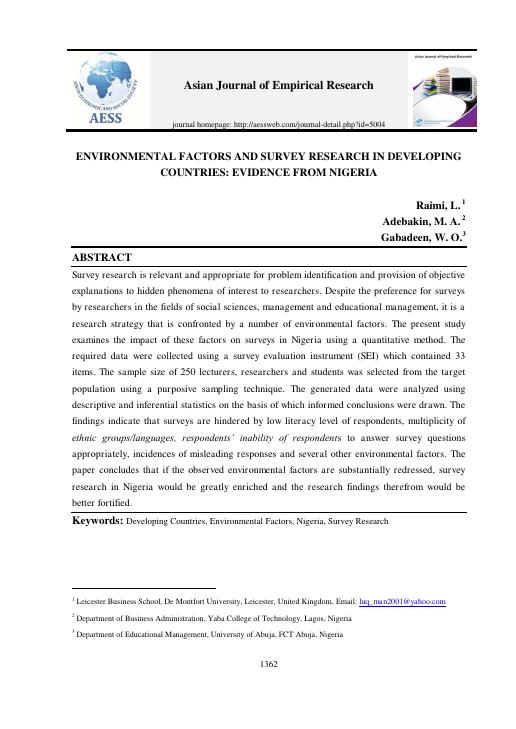
Asian Journal of Empirical Research, 3(10)2013: 1362-1381
1363
INTRODUCTION
Survey is a widely-used strategy for gathering data for academic and industry-based research
across the globe. Adoption of survey as a research strategy offers researchers comprehensive data
and rich field information for problem-solving (Denscombe, 1998; Kennedy and Vargus, 2001;
Sweeney, 2009). However, surveys in the forms of interviews, questionnaires, panels et cetera are
hindered by a number of environmental factors identified by researchers as low literacy level of
respondents, non-cooperation, non-response, interviewers‟ effects, multiplicity of languages,
respondent‟s inability to answer questions appropriately and incidences of misleading responses
(Watson and Wooden, 2009). The above-mentioned inhibiting factors are not limited to
developing nations, the same trends had manifested several years back in the developed nations,
where surveys are more advanced. It is therefore a global phenomenon (The International
Conference on Survey Nonresponse, 1999; Kennedy and Vargus, 2001; Gannon-Leary et al.,
2002). Even the website-enabled or technology-aided surveys are not free from environmental
challenges, some of which include: constraints of proper configuration of browsers, the right
operating systems, reliability of internet service providers, correct hardware, and the correct
routers requires for the website as well as expertise to design the web survey (Gannon-Leary et
al., 2002). The backlashes of surveys as enunciated above have become major concerns for
academic researchers. Kennedy and Vargus (2001:483) lament:
“Survey research is currently experiencing significant challenges that have
important implications for both the method and its use.... Survey participation is
declining, and this trend is likely to continue. Some causes may be cultural... a
decrease in civic engagement...some causes may be more practical...increased
telemarketing and fundraising telephone calls and letters that confuse potential
survey participants.”
Beyond the highlighted factors, other common factors inhibiting surveys include peculiar nature
of survey strategy, diverse modes of survey, proliferation of surveys and preference for self-
administered survey, emergence of computer-aided questionnaires, discouraging length of
questionnaire and vague survey questions leading to cognitive burden, non-response, rising cost
of surveys, limited financial resources, lack of cooperation from participants and poor response
rate (The International Conference on Survey Nonresponse, 1999; Kennedy and Vargus, 2001;
Gannon-Leary et al., 2002). From all the factors listed above, the challenge of poor response rate
is considered a very serious threat; it is as low as 20% in some surveys to as high as 75%
depending on the target group and the survey content (The International Conference on Survey
Nonresponse, 1999).
1363
INTRODUCTION
Survey is a widely-used strategy for gathering data for academic and industry-based research
across the globe. Adoption of survey as a research strategy offers researchers comprehensive data
and rich field information for problem-solving (Denscombe, 1998; Kennedy and Vargus, 2001;
Sweeney, 2009). However, surveys in the forms of interviews, questionnaires, panels et cetera are
hindered by a number of environmental factors identified by researchers as low literacy level of
respondents, non-cooperation, non-response, interviewers‟ effects, multiplicity of languages,
respondent‟s inability to answer questions appropriately and incidences of misleading responses
(Watson and Wooden, 2009). The above-mentioned inhibiting factors are not limited to
developing nations, the same trends had manifested several years back in the developed nations,
where surveys are more advanced. It is therefore a global phenomenon (The International
Conference on Survey Nonresponse, 1999; Kennedy and Vargus, 2001; Gannon-Leary et al.,
2002). Even the website-enabled or technology-aided surveys are not free from environmental
challenges, some of which include: constraints of proper configuration of browsers, the right
operating systems, reliability of internet service providers, correct hardware, and the correct
routers requires for the website as well as expertise to design the web survey (Gannon-Leary et
al., 2002). The backlashes of surveys as enunciated above have become major concerns for
academic researchers. Kennedy and Vargus (2001:483) lament:
“Survey research is currently experiencing significant challenges that have
important implications for both the method and its use.... Survey participation is
declining, and this trend is likely to continue. Some causes may be cultural... a
decrease in civic engagement...some causes may be more practical...increased
telemarketing and fundraising telephone calls and letters that confuse potential
survey participants.”
Beyond the highlighted factors, other common factors inhibiting surveys include peculiar nature
of survey strategy, diverse modes of survey, proliferation of surveys and preference for self-
administered survey, emergence of computer-aided questionnaires, discouraging length of
questionnaire and vague survey questions leading to cognitive burden, non-response, rising cost
of surveys, limited financial resources, lack of cooperation from participants and poor response
rate (The International Conference on Survey Nonresponse, 1999; Kennedy and Vargus, 2001;
Gannon-Leary et al., 2002). From all the factors listed above, the challenge of poor response rate
is considered a very serious threat; it is as low as 20% in some surveys to as high as 75%
depending on the target group and the survey content (The International Conference on Survey
Nonresponse, 1999).
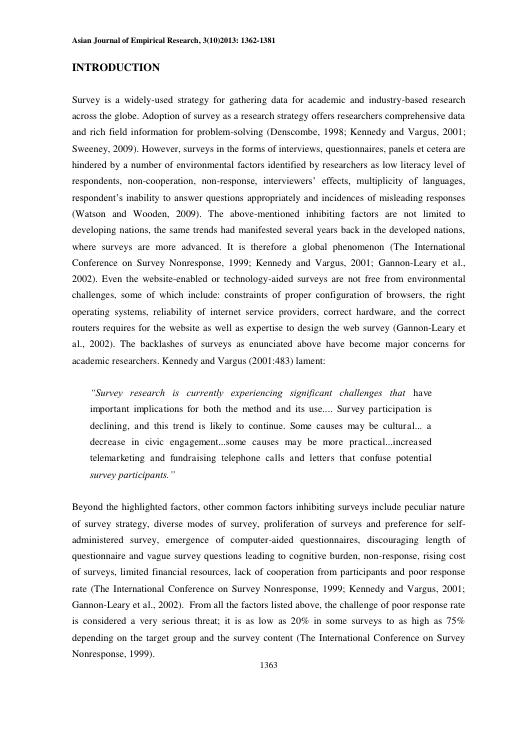
Asian Journal of Empirical Research, 3(10)2013: 1362-1381
1364
Furthermore, Gannon-Leary et al., (2002) confirmed the seriousness of the phenomenon of non-
response and its impact on surveys in their operations research; they had great difficulty
administering questionnaires to students. After series of trials and deployment of different
techniques, they succeeded in sending questionnaires to student respondents using electronic mail,
direct posting of questionnaires into students‟ pigeonholes, direct contact with students in their
rooms and visit to departmental common rooms.
In view of the foregoing, this exploratory paper investigates the environmental factors affecting
survey research in developing countries with special reference to Nigeria. The paper is structured
into five parts. Part I gives an introductory background on the research problem. Part II is
dedicated to review of literature with emphasis on definitions, types, merits and demerits of
surveys (interview and questionnaire techniques). Part III provides theoretical and empirical
issues, methodology and research hypotheses. Part IV is devoted to results and findings. Part V
concludes with the implication of the findings in theory and practice as well as recommendations.
REVIEW OF LITERATURE
Conceptual Issues and Survey Typologies
For better clarity, there is a need to discuss the meaning, scope and types of survey found in
research methodology. According to Saunders et al. (2012:177), survey is one of the common
strategies use in exploratory and descriptive investigation. It is found to be potent in providing
answer to inquiry into “what‟, who‟, where‟, „how much‟ and how many questions.” However,
Denscombe (2010) stated that when a social phenomenon is surveyed by field researcher, the
implication is that the object of research is thoroughly investigated and explored for the purpose
of collecting meaningful and informed data/information. From the definitions above, scholars
cautioned that when developing a research design, survey is not a research method but a research
strategy among several other competing strategies such as experiments, case study, ethnography,
archival et cetera (Denscombe, 2010; Saunders et al., 2012).
Moreover, there are two typologies of survey, namely: interview-based and questionnaire-based
surveys (Babbie, 2010; Saunders et al., 2007; Saunders et al., 2012). Interview or Interview-
based survey is a qualitative research technique which involves asking the sampled respondents
questions for the purpose of collecting data and useful information „on a particular idea, program
or situation” (Boyce and Neale, 2006:.3). However, Babbie (2004), O‟Leary (2004) and Saunders
et al. (2012) remarked that interviews can be divided into three sub-typologies: unstructured,
structured and semi-structured interviews.
1364
Furthermore, Gannon-Leary et al., (2002) confirmed the seriousness of the phenomenon of non-
response and its impact on surveys in their operations research; they had great difficulty
administering questionnaires to students. After series of trials and deployment of different
techniques, they succeeded in sending questionnaires to student respondents using electronic mail,
direct posting of questionnaires into students‟ pigeonholes, direct contact with students in their
rooms and visit to departmental common rooms.
In view of the foregoing, this exploratory paper investigates the environmental factors affecting
survey research in developing countries with special reference to Nigeria. The paper is structured
into five parts. Part I gives an introductory background on the research problem. Part II is
dedicated to review of literature with emphasis on definitions, types, merits and demerits of
surveys (interview and questionnaire techniques). Part III provides theoretical and empirical
issues, methodology and research hypotheses. Part IV is devoted to results and findings. Part V
concludes with the implication of the findings in theory and practice as well as recommendations.
REVIEW OF LITERATURE
Conceptual Issues and Survey Typologies
For better clarity, there is a need to discuss the meaning, scope and types of survey found in
research methodology. According to Saunders et al. (2012:177), survey is one of the common
strategies use in exploratory and descriptive investigation. It is found to be potent in providing
answer to inquiry into “what‟, who‟, where‟, „how much‟ and how many questions.” However,
Denscombe (2010) stated that when a social phenomenon is surveyed by field researcher, the
implication is that the object of research is thoroughly investigated and explored for the purpose
of collecting meaningful and informed data/information. From the definitions above, scholars
cautioned that when developing a research design, survey is not a research method but a research
strategy among several other competing strategies such as experiments, case study, ethnography,
archival et cetera (Denscombe, 2010; Saunders et al., 2012).
Moreover, there are two typologies of survey, namely: interview-based and questionnaire-based
surveys (Babbie, 2010; Saunders et al., 2007; Saunders et al., 2012). Interview or Interview-
based survey is a qualitative research technique which involves asking the sampled respondents
questions for the purpose of collecting data and useful information „on a particular idea, program
or situation” (Boyce and Neale, 2006:.3). However, Babbie (2004), O‟Leary (2004) and Saunders
et al. (2012) remarked that interviews can be divided into three sub-typologies: unstructured,
structured and semi-structured interviews.
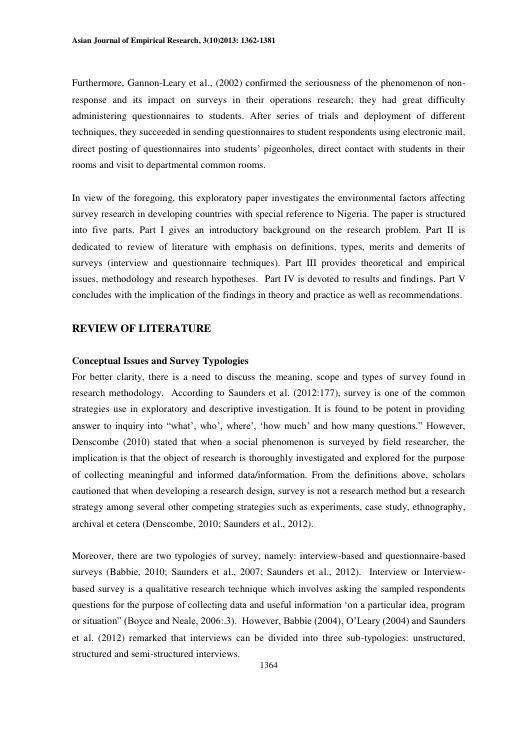
Asian Journal of Empirical Research, 3(10)2013: 1362-1381
1365
Questionnaire-based survey on the other hand is an age-long primary data gathering instrument
administered by field researchers to respondents/participants with clear instructions to respond to
structured questions by ticking, ranking or rating the most appropriate option of their choice.
According to Brace (2008), a questionnaire-based survey provides a communication medium for
researchers and their respondents to interact. There are several typologies of questionnaires, viz:
open-ended questionnaire, closed-ended questionnaire, self-completed questionnaires, researcher-
administered questionnaire, Computer-aided questionnaire, Telephone questionnaire, In-house
survey questionnaire; Mail Questionnaire (Collis and Hussey, 2003; Saunders, 1997; Babbie,
2004; Monette et al., 2005; Descombe, 2010).
Historically, the interview-based survey was adopted from clinical psychology and psychiatry and
has since emerged as a widely adopted method in qualitative research (Bryman, 2008; Sweeney,
2009). Interviews could be purely structured interview, semi-structured interview and
unstructured interview as mentioned earlier (Bryman, 2008; Sweeney, 2009; Saunders et al.,
1997; Saunders et al., 2012). However, the use of semi-structured interviews is more potent for
eliciting vital information on phenomenal issues that are under-researched (Sweeney, 2009).
Researchers are at liberty to pick from any of the three typologies after a critical review of the
nature of their research design.
Irrespective of the type of interview chosen, an interview offers a number of merits in qualitative
research. First and foremost, an interview-based survey provides researcher with the leeway to
conduct investigation deeply following a systematic line of action without deviation (Bell, 1999;
Denscombe, 1998; Birn, 2000). Where deviation surfaces, interview enables researchers make
spontaneous amendment, re- adjustments and re-direction of the line of investigation
(Denscombe, 1998). Consequently, the information, data and insights arising from interview are
usually very rich in content and comprehensive for research purposes (Denscombe, 1998; Birn,
2000; Sweeney, 2009). More importantly, where formal access is sought and granted, interviews
often enhance high response rate from target respondents (Denscombe, 1998; Saunders et al.,
2012).
Despite the inherent merits of interviews as clearly enunciated above, interviews have some
obvious disadvantages. The first is the laborious nature of interview technique for research when
viewed in terms of time invested, financial resources, long travels, continuous/repetitive
discussion with people of different background and idiosyncrasies (Bailey, 1982; Denscombe,
1998; Denscombe, 2010; Sweeney, 2009; Saunders et al., 2012). Secondly, where access is turned
down by interviewees, the response rate would be low thereby compromising research objective
because of inadequate sample that is statistically unrepresentative of the target population (Bell,
1365
Questionnaire-based survey on the other hand is an age-long primary data gathering instrument
administered by field researchers to respondents/participants with clear instructions to respond to
structured questions by ticking, ranking or rating the most appropriate option of their choice.
According to Brace (2008), a questionnaire-based survey provides a communication medium for
researchers and their respondents to interact. There are several typologies of questionnaires, viz:
open-ended questionnaire, closed-ended questionnaire, self-completed questionnaires, researcher-
administered questionnaire, Computer-aided questionnaire, Telephone questionnaire, In-house
survey questionnaire; Mail Questionnaire (Collis and Hussey, 2003; Saunders, 1997; Babbie,
2004; Monette et al., 2005; Descombe, 2010).
Historically, the interview-based survey was adopted from clinical psychology and psychiatry and
has since emerged as a widely adopted method in qualitative research (Bryman, 2008; Sweeney,
2009). Interviews could be purely structured interview, semi-structured interview and
unstructured interview as mentioned earlier (Bryman, 2008; Sweeney, 2009; Saunders et al.,
1997; Saunders et al., 2012). However, the use of semi-structured interviews is more potent for
eliciting vital information on phenomenal issues that are under-researched (Sweeney, 2009).
Researchers are at liberty to pick from any of the three typologies after a critical review of the
nature of their research design.
Irrespective of the type of interview chosen, an interview offers a number of merits in qualitative
research. First and foremost, an interview-based survey provides researcher with the leeway to
conduct investigation deeply following a systematic line of action without deviation (Bell, 1999;
Denscombe, 1998; Birn, 2000). Where deviation surfaces, interview enables researchers make
spontaneous amendment, re- adjustments and re-direction of the line of investigation
(Denscombe, 1998). Consequently, the information, data and insights arising from interview are
usually very rich in content and comprehensive for research purposes (Denscombe, 1998; Birn,
2000; Sweeney, 2009). More importantly, where formal access is sought and granted, interviews
often enhance high response rate from target respondents (Denscombe, 1998; Saunders et al.,
2012).
Despite the inherent merits of interviews as clearly enunciated above, interviews have some
obvious disadvantages. The first is the laborious nature of interview technique for research when
viewed in terms of time invested, financial resources, long travels, continuous/repetitive
discussion with people of different background and idiosyncrasies (Bailey, 1982; Denscombe,
1998; Denscombe, 2010; Sweeney, 2009; Saunders et al., 2012). Secondly, where access is turned
down by interviewees, the response rate would be low thereby compromising research objective
because of inadequate sample that is statistically unrepresentative of the target population (Bell,
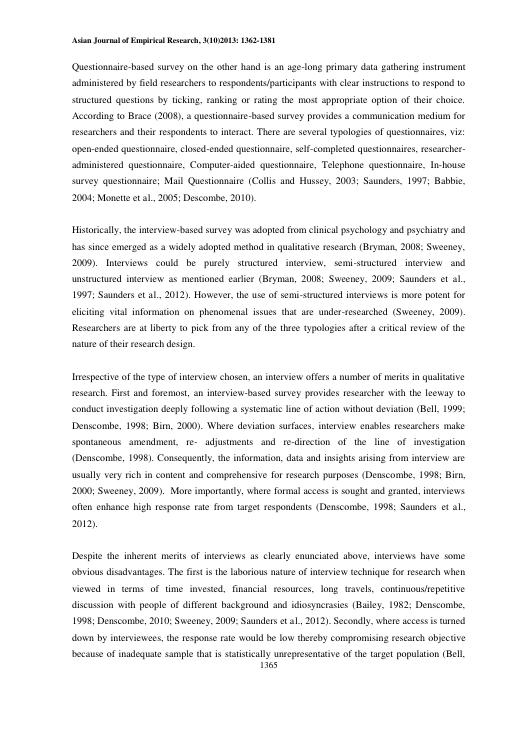
Asian Journal of Empirical Research, 3(10)2013: 1362-1381
1366
1999). Other disadvantages of interview are subjectivity issue, bias, difficulty in transcribing
recorded interviews, matching respondents‟ opinions to establish patterns/line of thought and
challenges of data analysis and data presentation as research findings in meaningful way (Bell,
1999; Saunders et al., 2012).
THEORETICAL AND EMPIRICAL ISSUES ON SURVEYS
This paper derives its theoretical underpinning from four related communication theories, namely:
Hermeneutics theory (HT), Agenda-setting theory (AST), Symbolic interactionism theory (SIT),
and Social judgment theory (SJT). These theories explain social interaction between two parties
(sender and receiver) as well as the medium used for communication. In this paper, the two
parties focused on are researchers and respondents.
Hermeneutics can be described as the creative method and professional style of interpreting
written texts, words, symbols and other classical writings across all fields. HT covers in-depth
interpretations of terms like assumptions, presuppositions, pre-understanding, signals, manner of
reporting, contents of report, semiotic, coded computer languages and philosophical nuances
beyond the comprehension of ordinary members of the public (Duvall and Hays, 2001; Kaiser and
Silva, 2007). In the anthropological literature, there are traditional and contemporary
hermeneutics. The traditional hermeneutics focuses on interpretations of ancient manuscripts
especially coded religious scriptures, while the contemporary is more embracing, as it entails
interpretations of all forms of verbal and non-verbal communication in qualitative research
(Ferguson et al., 1988; Jeanrond, 1994; Duvall and Hays, 2001). From the research viewpoint,
hermeneutics is concerned with the interpretation of field data and raw information generated via
interview and structured questionnaires for the purpose of making meaning out of them and
drawing conclusions on the subject of discussion. Put differently, the method of qualitative data
transcription, content analysis and extraction of meaning from data are the domain of
hermeneutics.
The second strand of communication theory is agenda setting theory (AST), which is constructed
on the foundation that the media (in this case researcher) set agenda and frame the minds of the
public (respondents) through information/messages/ideas disseminated to the society when
conducting surveys. In order words, “the media tell us what to think about, and how to think
about it” under the pretext of communication (McCombs and Reynolds, 2002:1-16). When
applied strictly to surveys, agenda setting theory presumes that structured interview questions and
contents of questionnaires are mechanisms designed by researchers to set agenda for the
1366
1999). Other disadvantages of interview are subjectivity issue, bias, difficulty in transcribing
recorded interviews, matching respondents‟ opinions to establish patterns/line of thought and
challenges of data analysis and data presentation as research findings in meaningful way (Bell,
1999; Saunders et al., 2012).
THEORETICAL AND EMPIRICAL ISSUES ON SURVEYS
This paper derives its theoretical underpinning from four related communication theories, namely:
Hermeneutics theory (HT), Agenda-setting theory (AST), Symbolic interactionism theory (SIT),
and Social judgment theory (SJT). These theories explain social interaction between two parties
(sender and receiver) as well as the medium used for communication. In this paper, the two
parties focused on are researchers and respondents.
Hermeneutics can be described as the creative method and professional style of interpreting
written texts, words, symbols and other classical writings across all fields. HT covers in-depth
interpretations of terms like assumptions, presuppositions, pre-understanding, signals, manner of
reporting, contents of report, semiotic, coded computer languages and philosophical nuances
beyond the comprehension of ordinary members of the public (Duvall and Hays, 2001; Kaiser and
Silva, 2007). In the anthropological literature, there are traditional and contemporary
hermeneutics. The traditional hermeneutics focuses on interpretations of ancient manuscripts
especially coded religious scriptures, while the contemporary is more embracing, as it entails
interpretations of all forms of verbal and non-verbal communication in qualitative research
(Ferguson et al., 1988; Jeanrond, 1994; Duvall and Hays, 2001). From the research viewpoint,
hermeneutics is concerned with the interpretation of field data and raw information generated via
interview and structured questionnaires for the purpose of making meaning out of them and
drawing conclusions on the subject of discussion. Put differently, the method of qualitative data
transcription, content analysis and extraction of meaning from data are the domain of
hermeneutics.
The second strand of communication theory is agenda setting theory (AST), which is constructed
on the foundation that the media (in this case researcher) set agenda and frame the minds of the
public (respondents) through information/messages/ideas disseminated to the society when
conducting surveys. In order words, “the media tell us what to think about, and how to think
about it” under the pretext of communication (McCombs and Reynolds, 2002:1-16). When
applied strictly to surveys, agenda setting theory presumes that structured interview questions and
contents of questionnaires are mechanisms designed by researchers to set agenda for the
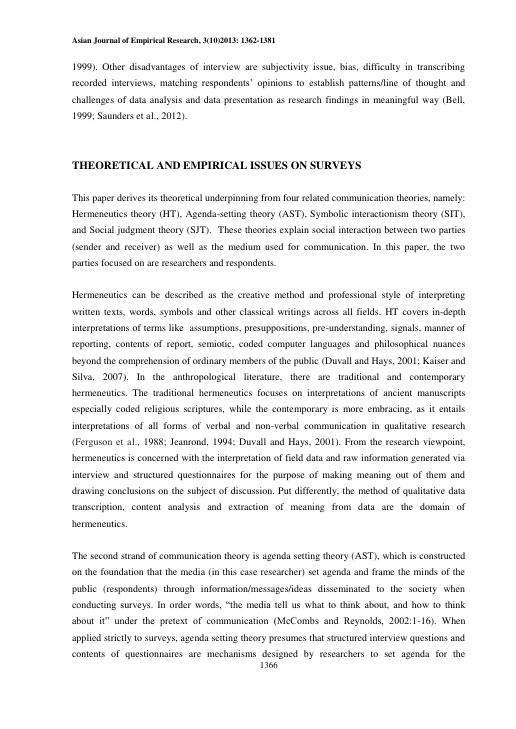
End of preview
Want to access all the pages? Upload your documents or become a member.
Related Documents
Nigeria Environmental factors and survey researchlg...
|5
|977
|371